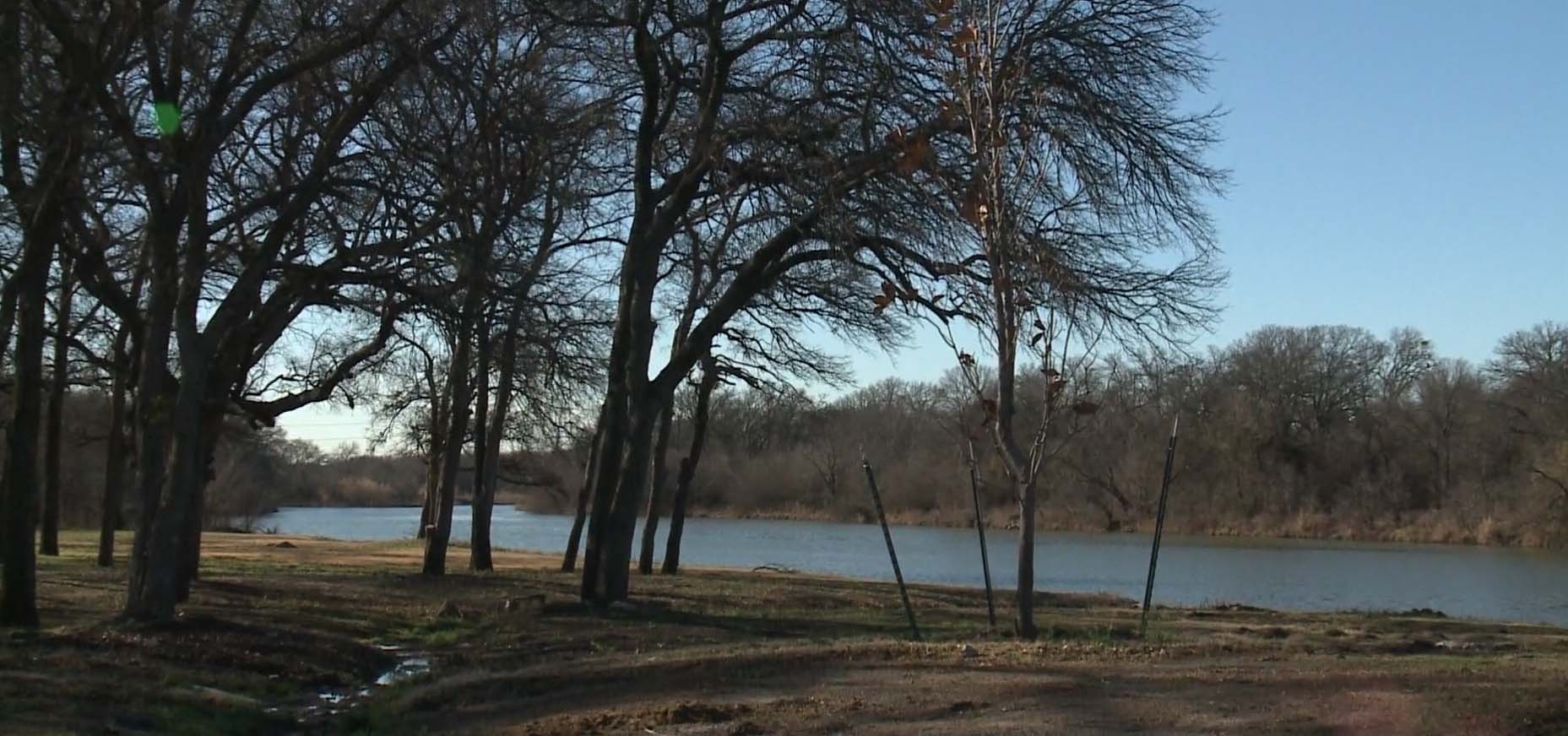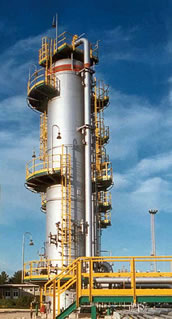Posts Tagged ‘Trinity East’
Easter’s Here, Do You Know Where Your City Manager Is?
 "Miss Suhm, this is a Good Friday moment, but I guarantee you from the faith well into which I reach, your Easter is coming and you will sail forth.”
"Miss Suhm, this is a Good Friday moment, but I guarantee you from the faith well into which I reach, your Easter is coming and you will sail forth.”
– Dallas City Council member and District 3 candidate Vonciel Jones Hill, offering Dallas City Manager Mary Suhm moral support after questioning by Angela Hunt over the Trinity East gas permits, Wednesday, February 27th, 2013
Dallas Park Driller Was Former Haz-Waste Handler Forced to Shutter California Plant for Violations
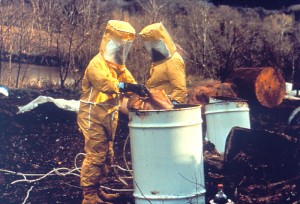 The President of the company at the center of the current Dallas drilling controversy was Vice-President and General Counsel of a hazardous waste disposal firm that was forced to close its California plant site after a long history of environmental violations.
The President of the company at the center of the current Dallas drilling controversy was Vice-President and General Counsel of a hazardous waste disposal firm that was forced to close its California plant site after a long history of environmental violations.
Thomas Blanton is President of Keystone, the parent company of Trinity East, which is applying to the City of Dallas for three gas drilling and production permits in the Trinity River flood plain near Irving. But in the 1990’s and early years of this century, he was a leading officer of the Board of Directors of US Liquids, a large broker of hazardous wastes that had its California facility ordered shut by the state’s California Department of Toxic Substances Control.
From 1999 to 2003, US Liquids owned Romic Environmental Technologies Corporation. Romic’s Bay Area operation received hazardous wastes from throughout the country, “blended” them on-site, and then shipped the toxic soup for use as “fuel” for cement plants like the TXI kilns in Midlothian.
Records show that from 1999 to 2004, Romic was slapped with 28 separate environmental violations by the State of California, which resulted in penalties of $849,500. The California Occupational Safety and Health Administration (CalOSHA), discovered 57 violations at the plant from 1988 to 2004, totaling another $163,360 in fines.
Romic closed in 2007 on orders from the state of California as part of a legal settlement stemming from a series of environmental violations. The state and EPA ordered a clean up and closure of the facility after extensive soil and ground water contamination was discovered over most of the site. According to the EPA, the contamination is primarily attributed to the spills, overflows, flooding events, and other accidental releases around the “central process area.” The primary contaminants were volatile organic compounds such as trichloroethene (TCE), a solvent used to clean metal parts. Toxins migrated as much as 80 feet below ground that borders San Francisco Bay tidal marshes.
All three sites that Blanton’s company wants to drill on are located in the Trinity River’s 100-year flood plain; two are also on City of Dallas park land. Opponents have warned about probable contamination from surface spills, which a 2011 UT study concluded were more frequent with fracking than conventional drilling.
It was recently disclosed that a Trinity East sister company experienced a casing failure at an Irving gas well it tried to drill in 2009, although the extent of any environmental damage caused by the incident remains unknown.
“Does Dallas really want hand over its park land to a businessman who has a history of contaminating and threatening soil and water resources?” asked Gary Stuard, Chair of Downwinders at Risk, a local DFW clean air group that’s been battling the Trinity East permits.
After denying Trinity East’s permits once last December, the City Plan Commission is scheduled to vote a second time on them at its meeting on Thursday afternoon.
Stuard was critical of the lack of due diligence city staff had performed on Trinity East and its owners and said this new information was another example of residents doing the job themselves. “There’s never been a review of the company’s track record by the City. It had gone completely unexamined until Dallas residents took it upon themselves to do the research. What else don’t we know because the City isn’t doing a routine background check?”
Back in California, the first phase of the EPA-ordered clean-up at the Romic site ended in 2010 with clean-up of surface and above ground messes. A second phase is addressing the remediation of below surface soil and groundwater contamination. The estimated cost for closure and cleanup of the facility is $2.5 million.
Dallas Morning News Says Enough is Enough: Deny Gas Permits
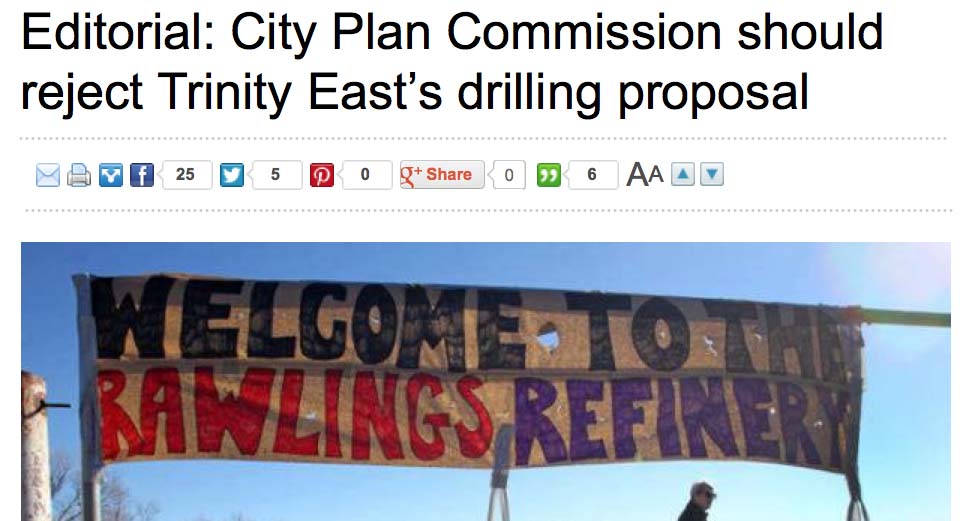 Win, lose or draw at Thursday's City Plan Commission vote, there is no question that, slowly, but surely, residents have built a consensus of public opposition to the Trinity East permits. For the latest proof, look no further than Wednesday's lead editorial in the Dallas Morning News advocating denial. It's the first time the paper has taken such a position. We know some of you can't get over the DMN paywall, so as a public service, here's the whole peice.
Win, lose or draw at Thursday's City Plan Commission vote, there is no question that, slowly, but surely, residents have built a consensus of public opposition to the Trinity East permits. For the latest proof, look no further than Wednesday's lead editorial in the Dallas Morning News advocating denial. It's the first time the paper has taken such a position. We know some of you can't get over the DMN paywall, so as a public service, here's the whole peice.
Groups Call for Full Open Public Hearing for Dallas Gas Permits Vote on Thursday
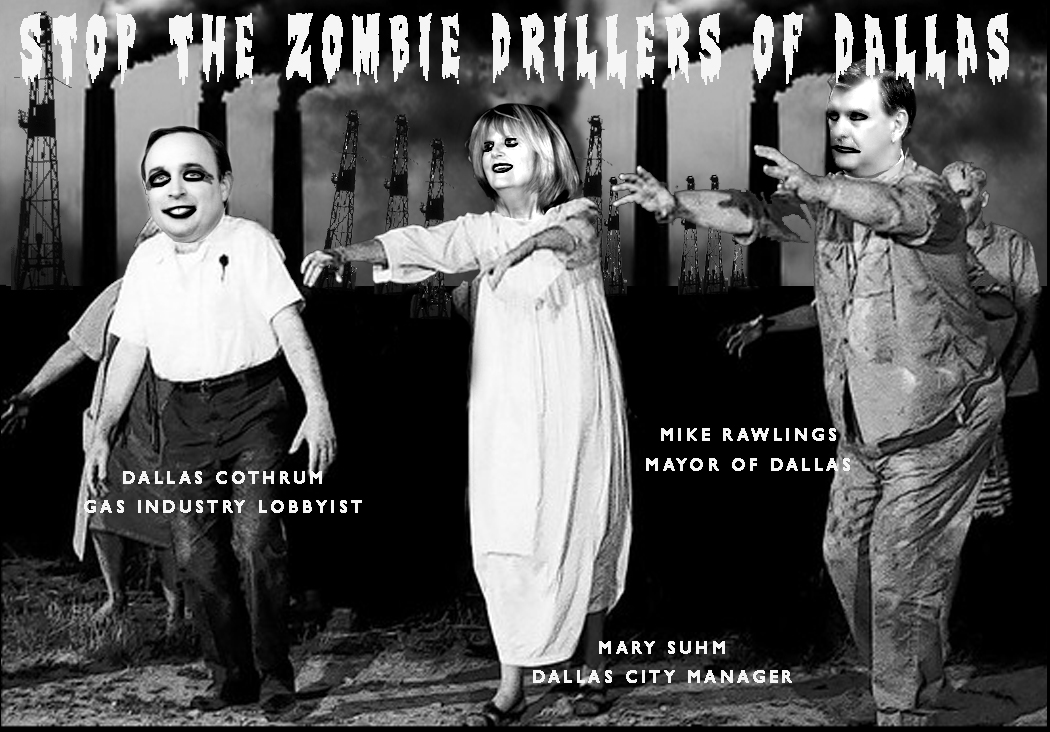 Here's the full text of a letter that was sent to all Dallas City Plan Commission members last week:
Here's the full text of a letter that was sent to all Dallas City Plan Commission members last week:
Commissioners and Chair,
Despite the request to the City Council made by members of the Commission on February 7th to change city policy in order to accommodate the Trinity East gas permits by your March 21st meeting, there has been no effort to do so.
For this reason alone, we urge you to take no action on these permits next week, or uphold your December 20th denial. These permits would allow surface drilling on park land and in floodplains, contrary to current city policy.
However, information and circumstances that have come to light since the December 20th vote to deny these permits make them even more objectionable.
We know that the proposed Trinity East processing facility and compressor station will be at least the 10th largest source of air pollution in the city, with a strong probability that emissions would grow to be much greater, out of the regulatory reach of the City of Dallas as they grow.
We know that city staff is working to locate this large air polluter next to the new Elm Fork Athletic Complex, in direct contradiction to recent city staff and City Council actions to protect the area around the Complex from lesser air pollution threats.
We know that, despite the title of the facility itself, the scale of operations, and the equipment it proposes to install, city staff refuses to classify Trinity East’s “Luna South Gas Processing Facility” as a gas processing facility under current City of Dallas zoning law.
We know that Trinity East misled the CPC at your February 7th meeting when its representative told you that gas well casings always protect underground aquifers. In fact, Trinity East had a casing failure at a previously undisclosed well in Irving, only a few miles away from the proposed Dallas sites, and with the City of Dallas participating in the lease agreement.
We know that on January 10th, Trinity East representatives told the Commission that its processing facility and compressor station would handle only the gas from its three Dallas sites—despite its Manager stating in published interviews that it was the centerpiece of a larger regional plan that incorporated Trinity East wells in at least two other cities.
We know that the city staff has a conflict of interest in performing an unbiased due diligence of the Trinity East permits because the City Manager had already pledged to support approval of the permits in a previously-undisclosed 2008 agreement. This is the reason there has not been a comprehensive review of the environmental and public health impacts of these permits by the City of Dallas staff, as there have been for other proposed polluting facilities in the same area as the Trinity East sites.
We know that a complaint has been filed with the Dallas County District Attorney’s Office alleging possible Open Meetings Act violations leading up to the January 10th CPC meeting that could make a second, “reconsidered” vote on the Trinity East permits illegal.
We know that a vote to approve these Trinity East permits is a vote condoning five years of the public, the Commission, the Park Board, and the City Council being intentionally mislead by the City Manager concerning the circumstances of these specific sites. It is perhaps the most important vote you will cast as a City of Dallas Plan Commissioner.
If you do decide to take a second vote on the Trinity East permits at your March 21st meeting, we request that you adopt special public hearing procedures that will guarantee a Dallas resident’s right to speak.
Based on the experience of the Commission’s February 7th meeting, the CPC format of 15-minutes per-side is clearly not adequate to allow everyone who wishes to give testimony on this high profile and controversial issue to be heard.
Because the CPC only meets during weekdays, many of us take off from our jobs or home responsibilities to attend. Our time should be respected. When a government entity announces a public hearing, it should be willing to listen to everyone who makes the effort to attend and speak. You owe us that courtesy.
The only time citizens have become angry during CPC meetings has been when they were completely shut-out of any opportunity to provide public comment (January 10th), and when public comment was shut down prematurely with many dozens of speakers still lined up to give testimony (February 7th). We make no apology in standing up for our right to speak out.
To avoid future frustrations, any definitive vote on the Trinity East permits taken on March 21st should be preceded by an inclusive, open-ended public hearing that gives each person their say. Toward that end, we propose that the CPC adopt the City Council rules for public hearing and allow everyone who wants to testify a total of 3 minutes each. The hearing would remain open until the last person spoke. Commission members would still be able to ask questions of specific presenters. This offers freedom of speech without sacrificing any of your tools to elicit further information from the participants.
We know that some of you must be as frustrated as ourselves in having to revisit this issue time and again, but there is a way to definitely put it to rest. Let the December 20th denial of the Trinity East permits stand.
Thank you for your consideration.
Raymond Crawford
Dallas Area Residents for Responsible Drilling
Jim Schermbeck
Downwinders at Risk
Sharon Wilson
Earthworks’ Oil & Gas Accountability Project
Marc McCord
FracDallas
Ed Meyer
Mountain Creek Neighborhood Alliance
Molly Rooke
Greater Dallas Chapter, Sierra Club
Zac Trahan
Texas Campaign for the Environment
Dallas Drilling Scandal Gets Its Very Own SLAPP Suit Threat
 Let's see, so far the Great Dallas Drilling Scandal™ includes illegal drilling sites, a secret agreement, secret wells….in Irving, citizen protests, allegations of Open Meetings violations, likely Open Records violations, a surprise refinery, comparisons to Christ, and at least one grassroots city council candidacy. Missing until now was it's very own SLAPP suit (Strategic Lawsuit Aimed at Public Participation).
Let's see, so far the Great Dallas Drilling Scandal™ includes illegal drilling sites, a secret agreement, secret wells….in Irving, citizen protests, allegations of Open Meetings violations, likely Open Records violations, a surprise refinery, comparisons to Christ, and at least one grassroots city council candidacy. Missing until now was it's very own SLAPP suit (Strategic Lawsuit Aimed at Public Participation).
Check.
Monday saw the announcement that lawyers for the company behind the three controversial Dallas gas permits had sent a nasty letter to one Zac Trahan of the Texas Environmental Campaign telling him to cease and desist in handing out flyers telling people that a casing failure at one of the company's wells in Irving could have harmed groundwater. Since it happened deep underground and there has been no public disclosure of post-failure testing, it's impossible to say whether it caused harm to groundwater or not. But that didn't keep Trinity East from wanting full exoneration. According to a letter from the law firm representing Trinity East,
"That statement is absolutely false. Trinity East's prior well did not contaminate any underground water aquifers. In fact, any casing failure on that well could not have caused or produced aquifer contamination because surface casing was set and cemented at required depths (per Texas Commission on Environmental Quality rules) to protect all fresh water aquifers. TCE's actions are unlawful, and constitute, at a minimum, defamation under Texas law. There is no question that TCE fabricated this fiction and then disseminated it with the specific intent of interfering with Trinity East's rights under its lease with the City of Dallas."
That would be the previously undisclosed lease(s) with the City of Dallas over at the University of Dallas, in Irving (it's complicated) that have only recently come to light after citizen investigation and published reports in the Dallas Observer and Morning News.
The flyers in question were from Dallas Residents at Risk and only claimed that the casing failure may have contaminated groundwater. There's no way that Trinity East's lawyers could prove there was no contamination. We'll probably never know for sure. But the primary point of the letter is not to dispute the statement. It's to scare Zac, TCE and Dallas Residents at Risk into not saying stuff like this again, or they'll sue. Or at least talk a lot like they're going to sue. They'll really mean it. Sort of. Honest.
The tip-off about what this letter is really about is that it didn't come from the law firm representing Trinity East in the permitting process but from a firm (Kelly Hart and Hallman) that apparently makes targeting environmental groups a specialty. Only a short while ago, it actually sued TCE over a landfill expansion dispute. In this case however, Trinity East probably dreads actually taking Zac and Co. to court because then all documents about the (previously undisclosed) well could be reviewed by TCE and the public.
Although it's a sideshow to the on-going scandal over approving permits to do things that aren't legal, Trinity East's letter shows citizens hit a nerve by pulling back the curtain on the company's current operations. Representatives of Trinity East never fail to mention how many wells the company has drilled in the Barnett Shale, but as far as we can tell, nobody at Dallas City Hall has ever researched the company's environmental and safety track record. Once again, it was citizens performing the minimum due diligence that first came across the information on the existence of the Irving wells themselves, much less the casing failure.
Oh that. On February 7, 2013 Trinity East Energy's Tom Blanton told the City Plan Commission that "Trinity East Energy has never had a casing failure." Was he forgetting about the Irving well? Was he fudging a bit because it was done by the "Expro Energy" part of Trinity East? Or was he just not telling the truth? No matter, Dallas City Hall took the claim at face value and never checked. Why not? Maybe because they knew that doing so would reveal a long-standing prior relationship between the City and Trinity that included a well with a casing failure. Wow. That would be embarrassing.
Take a Tour of Dallas Gas Sites and Decide for Yourself if They’re Wasteland
(Dallas)—-A local clean air group released a short film of an official Dallas City Plan Commission tour of controversial gas drilling and production sites that it says rebuts the claims made by City Council members during last Wednesday's City Manager’s briefing on parkland drilling that the land is "desolate" and a "wasteland.”
Downwinders at Risk posted "Dallas Fracking Mystery Tour” early Tuesday morning for public viewing on its own website. It's a fast-paced four minute journal of a January 31st City Plan Dallas City Plan Commission bus tour of all three proposed Trinity East gas permit sites in Dallas: The Gun Club and the LB Houston/Luna Vista Golf Course drilling sites, both on city parkland, as well as the Luna Vista Processing Plant site, aka, "The Rawlings Refinery and Compressor Station," located only a short distance away from the City of Dallas' new Elm Fork Athletic Complex.
The group hired a local professional filmmaker to accompany the 15 Plan Commissioners, various city staff and members of the public on the half-day outing from the time they boarded two buses at City Hall to the last site visit, including question and answer sessions between Commissioners and David Cossum, the City of Dallas Assistant Director of Sustainable Development and Construction. The result is a quick take on each of the sites through the eyes of the tour participants.
“Contrary to claims by Council members who’ve never visited the sites they want to condemn, the Trinity River bottoms are not “wasteland,” said Jim Schermbeck, Director of Downwinders. “Even a quick look like this tour offered shows its never going to be mistaken for a Midland-Odessa oil patch.”
During last Wednesday’s briefing, Council member Sheffie Kadane compared the park land sites at the Gun Club and the Golf Course to West Texas oilfields, Council member Jerry Allen called them a “wasteland,” and Council member Dwaine Caraway said they didn’t represent “quality park land.” But looking at it the sites from the perspective of the Plan Commission tour, one sees expanses of hardwood forests, sculpted fairways, and a peacefully flowing Trinity River close-by.
Besides offering a striking visual counterpoint, the tour’s on-site Q&As between Plan Commission and City staff reveal other mistakes in drilling proponents’ claims about the sites. For example, Kadane has insisted there would never be drilling equipment in the actual flood plain, but as Cossum explains to an inquiring Commissioner, there will be.
Another Q&A at the refinery and compressor station site reveals City staff’s contradictory stances on sources of pollution surrounding the Elm Fork Athletic Complex – a new recreation facility expected to attract hundreds or thousands of children and their families on weekends.
The city is opposing a new permit from a near-by rock crushing facility permit because of concerns about its 17 tons of annual air pollution so close to the Complex, but supporting the construction of a gas refinery and compressor station that will admittedly release at least 75 tons a year of air pollution only 50 feet further away.
Using the Beatles’ “Magical Mystery Tour” as a recurring soundtrack, the short film uses no voice over narration, relying only on the comments of tour participants and text. It repeatedly asks why the city would contradict its own current policy, answering that “It was a Mystery” at the time of the tour.
However in a postscript, it adds the February 7th Dallas Observer publication of the 2008 “secret agreement” between Dallas City Manager and Trinity East to exchange funds for leases on city land for city staff help in approving drilling and production permits. “Suddenly, it wasn’t a mystery anymore.”
Schermbeck says his group hopes the film will put “a face on the sites” they haven’t had before, and offer a short, entertaining way to get educated about the controversy. “There’s been a lot of misinformation about these sites perpetrated by people who’ve never visited them. People can now see them the way the Plan Commission did and decide for themselves.“
Last Rig Standing: the Stakes for February 7th Dallas Vote
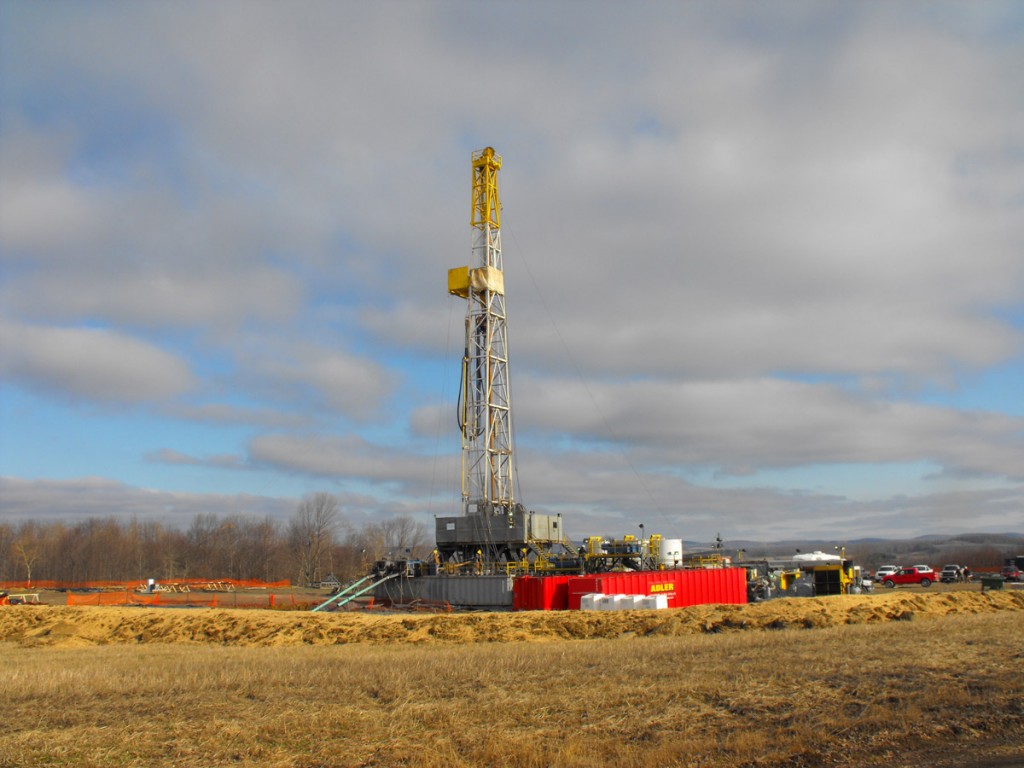 Today, DMN Dallas City Hall reporter Rudy Bush wrote that the Exxon-Mobile gas drilling subsidiary XTO has decided to permanently withdraw its requests for gas drilling permits in the city. Previously, the company had said it was "suspending" activity on the permits.
Today, DMN Dallas City Hall reporter Rudy Bush wrote that the Exxon-Mobile gas drilling subsidiary XTO has decided to permanently withdraw its requests for gas drilling permits in the city. Previously, the company had said it was "suspending" activity on the permits.
With its decision, XTO becomes the second out of three gas companies to withdraw from drilling leases that were first signed with the City of Dallas in 2007. Chief Oil had already pulled out, apparently complaining that it was too hard to get a permit approved in Dallas.
That leaves only the three sites being pursued by Trinity East as the very last ones left over from the Wild West days of gas leasing in Dallas – the same sites that have been the subject of so much controversy since the Mayor unilaterally decided to push them through after Thanksgiving.
To summarize, Dallas citizens have beat back all but three pre-2008 gas drilling permit requests in order to make sure any drilling done in the city is implemented under a new, more protective, and as yet, unwritten, gas drilling ordinance.
That's why the February 7th "re-do vote" on the Trinity East permits at the City Plan Commission is a decisive one. That's why we keep asking for your help in winning it. We get rid of these three sites and we've managed to avoid the mistakes of just about every city west of Dallas over the past decade. We draw a line in the Shale.
We are three sites and one February 7th vote away from starting with a clean slate. Three sites and one February 7th vote away from not having to worry about "grandfathered" gas facilities. Three sites and one February 7th vote away from keeping Dallas responsible in its drilling.
All that's standing in our way is Dallas City Hall.
In contrast to what seems like a kind of nonchalant attitude by Mayor Rawlings in the DMN article, we know for a fact that he and the City Manager are launching a full court press to make sure the Trinity East permits get approved, despite their locations, pollutants and impact on public health. If the Plan Commission railroad job earlier this month didn't convince you, please look at what kind of legal back flips the city attorneys are doing to cover-up how bad the permits are.
Over this last week we've seen the city change its definition of what a compressor station is in reaction to discovering that it had one hiding in the Trinity East Elm Fork permit. What just last year had required a special zoning district to be built now no longer does. Now, the compressor station and refinery that Trinity East wants to operate are all just part of the "normal well head production" that every pad site has. Honest, that's what Dallas City Hall is saying – that a refinery and compressor station are now part of everyday normal pad site operation. Every well head needs one! But Dallas City Hall also says it has no way to distinguish between normal production equipment and anything bigger, including a miniature Texas City on the Trinity.
This interpretation of the current regulations was simply proclaimed by lawyers, not passed as policy. It has no basis in engineering or science or existing regulation. There are facilities much smaller than the planned Trinity East Elm Fork plant that are regulated as "compressor stations" and "processing plants" by the Texas Commission on Environmental Quality. Dallas thinks it can downsize the pollution from these facilities just by changing what they call them.
That's how desperate they are to approve these Trinity East permits. It'd be laughable – if these things weren't being said by City of Dallas attorneys with straight faces in meetings with citizens.
It's about the process as much as the pollution now. City Hall is twisting the municipal machinery all out of shape in service to a single gas company. That's why we need you to come and stand with us on the 7th.
Where Were You?
 When the City of Dallas Decided
When the City of Dallas Decided
….to either let a vote stand, or steal it
….to defend air quality, or approve a new refinery that will be a top ten polluter
….to protect parks and floodplains, or make them industrial sites
….to listen to its residents, or a single gas company
The City Plan Commission Can Decide All These Things Today
Thursday 1:30 pm 6th Floor City Council Chambers
Dallas City Hall
1500 Marilla
Guess What? That “Drilling” Permit is Really for a Refinery
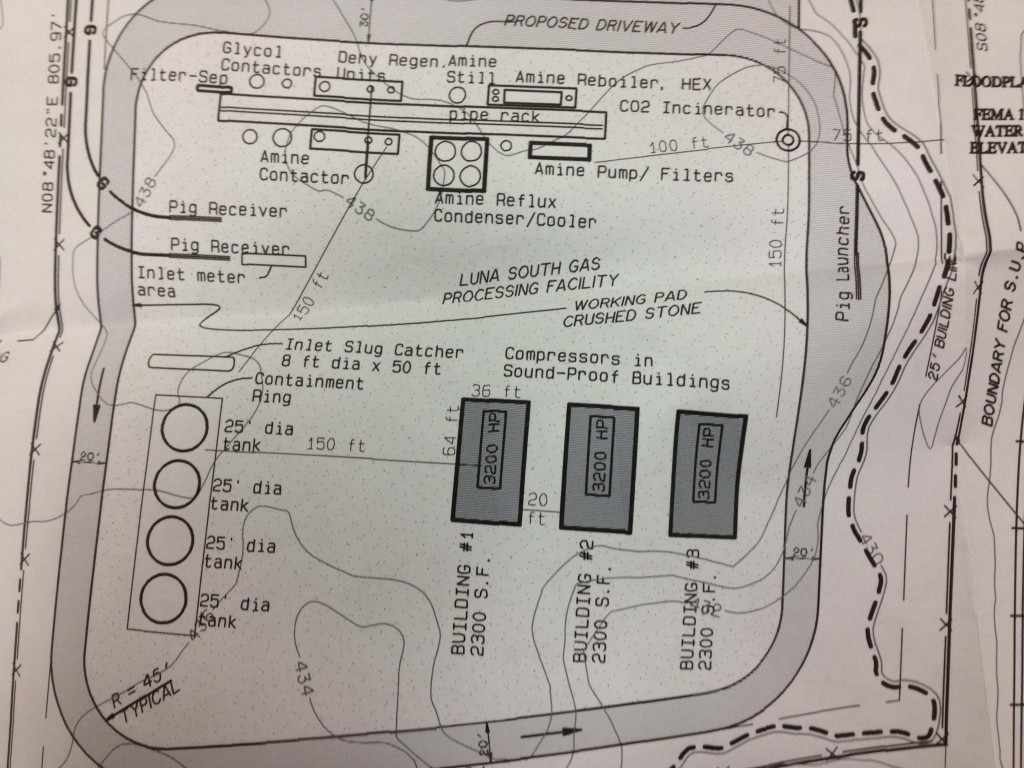 Under the guise of "gas drilling," Dallas City Hall and industry are pressing for approval of a permit that would locate a gas refinery only 600 feet from the new Elm Fork soccer complex, and immediately give birth to one of the ten largest air polluters in the City of Dallas, as well as one of its most toxic.
Under the guise of "gas drilling," Dallas City Hall and industry are pressing for approval of a permit that would locate a gas refinery only 600 feet from the new Elm Fork soccer complex, and immediately give birth to one of the ten largest air polluters in the City of Dallas, as well as one of its most toxic.
"There's a huge toxic Trojan Horse hiding in what the City and Trinity East describe as just a gas drilling permit," charged clean air activist Jim Schermbeck of Downwinders at Risk. "In fact, the Elm Fork permit allows for the building of a gas refinery that houses at least three giant compressors as well as an entire acid gas removal unit that strips off hydrogen sulfide, one of the most dangerous substances in the gas patch."
A motion to "reconsider" the Dallas City Plan Commission's 7-5 December 20th rejection of the Elm Fork permit and two other Trinity East gas sites is being advocated by CPC Chair and Mayoral appointee Joe Alcantar at this Thursday's meeting. If successful, the "reconsideration" would require the CPC to hold a second hearing and re-vote on the permits less than a month after denying them.
Opponents say the move is an act of desperation on the part of the Mayor and City Manager to protect a secret deal that was made between the City and Trinity East when the company first paid for mineral rights leases on city owned land. In interviews, the Mayor himself has said that a "deal was cut." Residents say the public was left out of that deal.
But after making calls to City Hall, Schermbeck is convinced that no one in Dallas city government is aware that the "gas drilling permit" being proposed by Trinity East is actually a permit to build a large gas refinery in the Trinity River floodplains.
"They're in way over their heads. City attorneys are still describing this as a drilling permit, but that's not what takes up most of the acreage on this site – it's all about the refinery."
During the December 20th City Plan Commission hearing on the permit, Trinity East representatives stated that the three proposed compressors alone – huge locomotive sized diesel-powered engines that produce thousands of horsepower in order to move gas through pipelines – would release 25 tons of air pollution each every year for an annual total of 75 tons.
That number would immediately place the facility among the city's ten largest air polluters according to the latest state emission totals from 2010. It would join power plants, asphalt and roofing materials manufacturers, and chemical plants as one of the city's biggest "stationary sources" of pollution.
However, Schermbeck thinks Trinity is low-balling their total air pollution impacts by not including other on-site refinery sources like its battery of storage tanks and "acid gas removal" operation that's designed to strip dangerous hydrogen sulfide off of natural gas streams through a series of acid baths and heat.
Hydrogen Sulfide is a harmful and toxic compound. It is a colorless, flammable gas that can be identified by its "rotten egg" odor. This invisible gas is heavier than air, travels easily along the ground, and builds up in low-lying, confined, and poorly ventilated areas. It acts as a chemical asphyxiant through inhalation exposure and its effects are similar to cyanide and carbon monoxide, which prevent the use of oxygen.
The equipment to strip off Hydrogen Sulfide from raw gas is large, complicated and dangerous. Site plans show a 200 foot long "pipe rack" with at least 20 "point sources" or stacks, apart from the compressors, where pollution could be released into the atmosphere.
"This isn’t a facility you want near parks or kids," said Schermbeck. "Yet, the City of Dallas seeks to put it just 600 feet away from its new huge soccer complex that’s meant to attract thousands of kids for hours every week."
Such a gas facility also challenges regional smog goals. A 2012 study from the Houston Advanced Research Center found that "routine emissions from a single gas compressor station can raise ozone levels by 3 parts per billion (ppb) as far as five miles downwind, and sometimes by 10 ppb or more as far as 10 miles downwind."
The Trinity East numbers don't reflect the release of greenhouse gas pollution either, which could be enormous from a facility the size of the refinery being proposed. Gas processing plants can release 20 to 80,000 tons of greenhouse gases a year. By comparison, the entire inventory of greenhouse pollution from all Dallas industrial sources in 2005 was 25,000 tons a year.
None of this information was brought up at the December 20th CPC hearing on the Elm Fork permit because the permit request in its current form was only a couple of weeks old when it went to the CPC and the compressors were a last-minute addition to an older, pending request.
Citizens were lucky to get a crowd to even show up five days prior to Christmas, and Schermbeck believes no one at Dallas City Hall bothered to notice that one of the so-called drilling permits was a refinery permit.
"Because it had no expertise of its own, and it was ignoring citizens, City Hall was completely reliant on the company's version of what the permit was for, and Trinity East probably didn't want to admit they were stuffing one kind of permit inside of another. The City didn't perform its due diligence. The result is that it's been completely played by the company."
Schermbeck recounted that he could find no one at City Hall who had any idea of how Trinity East arrived at their "25 tons a year" air pollution figure, knew what kind of specific pollutants that tonnage included, or, most importantly, thought it would be good to know this information before the city handed the company a permit to operate an inner-city gas refinery.
"Mayor Rawlings and the City Manager seem content to give Trinity East a blank check to pollute Dallas air," he said.
A closer look at the refinery site plans also reveals equipment that is fundamentally at odds with the way Trinity East and the gas industry has been portraying what kind of gas Dallas has underneath it.
Up to now, gas operators have been saying Dallas gas is "dry" and without a lot of extra hydrocarbons found in "wet gas" further west. But the acid gas removal units and Glycol conductors proposed for the Elm Fork refinery are built for wet gas.
Schermbeck suggests that perhaps either the City has been mislead about the nature of the gas it owns or the nature of the Trinity East site. He theorized that instead of the Dallas refinery being built for dry Dallas gas, it might be aimed at wet gas coming from the west.
"Dallas would get none of the royalties, but all of the pollution."
Mad? Go to this link now and send an e-mail to the Dallas City Council and City Plan Commission that says you oppose these gas permits and the "reconsideration" of their denial by the Commission:
https://www.downwindersatrisk.org/featured-citizen-action
Do it Now.

